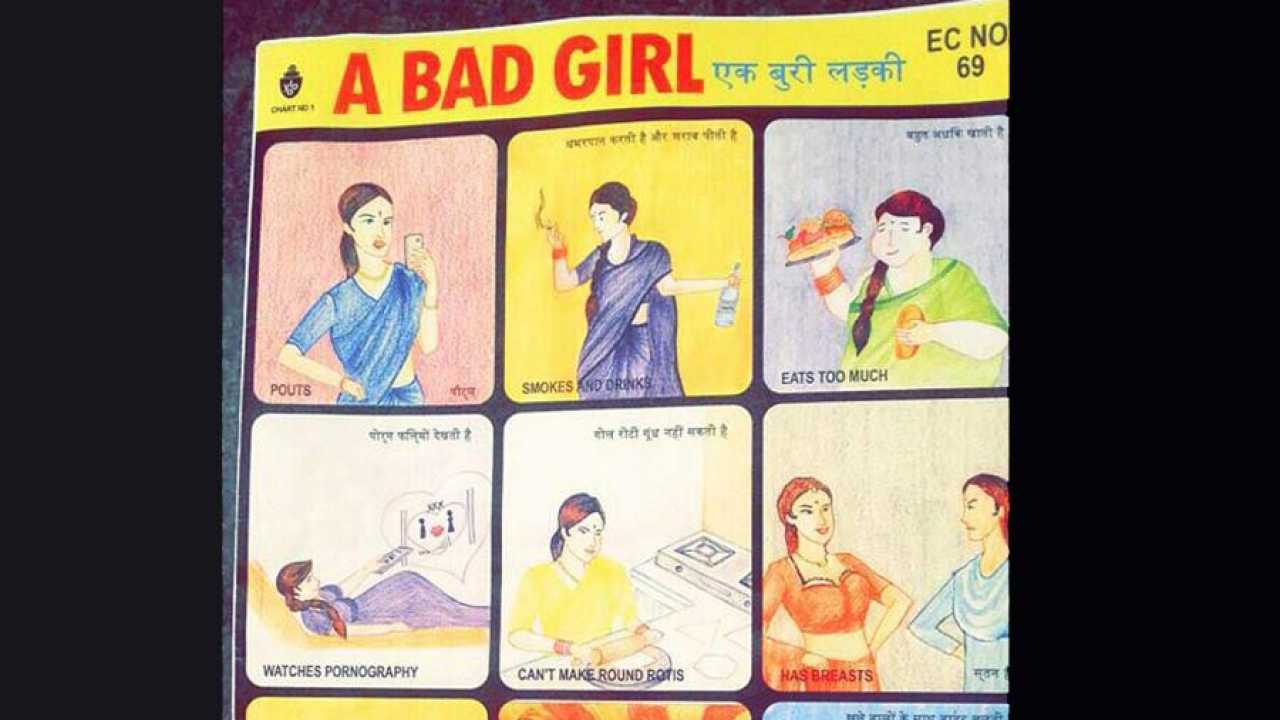
Do Indians have a penchant for stereotyping women?
A new cultural spoof that ridicules Indian society for compartmentalising women as 'good' and 'bad' has now gone viral on social media.
The image is a satire on old Indian Book Depot posters which often depicted 'good' and 'bad' activities of boys and girls, and found their way into school textbooks.
The image shows a sari-clad woman smoking, drinking, meeting her boyfriend in a park, driving a motorcycle, visiting Goa, making rotis that are not round in shape, eating too much or too little. The heading on top says 'Bad Girl' and the pictures show attributes of such a so called ill-charactered woman.
The spoof has been created by students of the Srishti School of Art and Design, Bangalore, and bears an uncanny resemblance to the style and tone of the popular Adarsh Balak illustrations created by Mumbai-based artist Priyesh Trivedi.
While the image has been doing the rounds of social media for a while, it caught the imagination of Twitter users on Thursday, with 'Good Girl' trending in India. The trend began when @Joylita tweeted this:
A bad girl...goes to Goa, can't make round rotis, has breasts. (Found this on Facebook) pic.twitter.com/bk50HqPR7g
— Joylita (@Joylita) February 18, 2015
The spoof is a riposte to continued labelling of women by some sections of Indian society, based on their habits and preferences. From politicians to doctors, teachers to parents, people of all occupations and backgrounds still seem to retain a traditional mindset when it comes to women's freedom.
The expression that a woman is in chains from the cradle to the grave still holds true for large swathes of India, and the spoof is an attempt to expose the shallowness and hypocrisy of these beliefs.
While there has been considerable progress as far as women's education, property rights and marriage rights are concerned, society still continues to draw an invisible line when it comes to a woman's independence.
Increasingly, one sees the prevalence of a social dichotomy. On the one hand, laws have become more and more gender-sensitive and women are making it big in fields which were once reserved exclusively for men. India is a country which is proud of its female pilots and army officers but still denies social equality to women.
Sexism is so pervasive in Indian society that girls are taught a different set of morals than boys, right from childhood. This discrimination was brought out well in school textbooks which once showed boys studying and girls sweeping the floor, as 'ideal' behaviour for each sex. And this lack of equality still manifests itself in several forms in most Indian households.
It is true that gender discrimination is not as obvious as it once was. For example, most educated families today would feed their daughters the same amount of the same quality of food that they feed their sons. There is a strong undercurrent of public opinion against female foeticide, rapes and gross mistreatment of women. However, this shows not an open-mindedness towards women's freedom, but towards welfare. Freedom involves the right to make life decisions - long-term, medium-term and minuscule. Being humane is not merely being concerned about a person's welfare, but also acknowledging their right to live as free human beings, and hold opinions or ambitions divergent to your own. This is where Indian society still falls woefully short when it comes to women.
And this is exactly why the 'Bad Girl' picture is perfect in its message. There are two aspects of such discrimination. One is the perception of 'good' women as models of perfection. The second is the idea of 'fun'.
Since women are supposed to be the torchbearers of 'perfection', women who smoke or drink are looked down upon. Indian society still opposes the idea of 'fun' of the non-essential kind because as a society we are wedded to the idea that materialism is an evil. Then, because women are supposed to be bearers of standard, the thought of them indulging in inessential 'enjoyment' - the likes of visiting Goa, falling in love or watching pornography - becomes repugnant to many Indians.
On the surface, social taboos directed towards certain activities seem rather superficial and ill-thought. For example, chewing tobacco is a very common practice among women of poor income backgrounds, but smoking is seen as taboo - though there is no obvious distinction between the effects of the two.
Modern India is changing fast, and this is a challenge to puritanism which discriminates against women. The chasm between traditional morals and lives of present-day Indian women grows ever deeper, but addressing this conflict with satire, perhaps helps drives home the point with force.